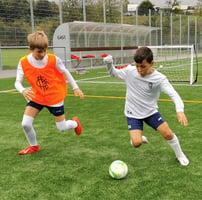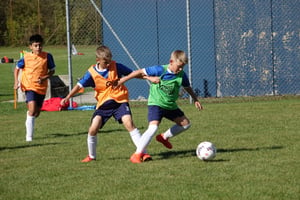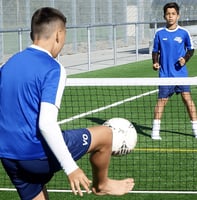Children can give free rein to their creativity in 1 vs. 1 games. In direct duels, they playfully...
Fun and technique - the perfect combination for football training with children
Football training with children not only improves technical skills - above all, it is fun and promotes decision-making skills and personal development.

Technique training with competitions and match decisions
Technical training in football is a great way to improve technical skills and have fun at the same time. Without fun, nothing works in children's training - it lays a solid foundation for athletic development with a laugh-learn-perform principle. This includes learning the basic techniques of passing, taking the ball, dribbling and shooting, which are taught through regular training in drills and games.
In order to increase the fun factor, game forms in which the children compete against each other in teams, score goals and prevent goals are ideal. Playing forms are holistic and develop all the techniques of football through many actions with the ball. They are very motivating by nature and require a variety of game decisions. In order to make the game fun in exercises in which individual techniques are trained in a focussed manner, they should be combined with competitions and goal actions. A passing relay with several teams, a goal-kicking competition or a goal kick after a slalom course have a much more motivating objective than an isolated exercise without competition and follow-up action.
The role of play forms in children's training
Game forms are an important part of children's football training. They allow the children to apply what they have learnt in a real-life game scenario and further improve their skills. The use of game forms makes training varied and motivating. The children have the opportunity to practise and develop various tactical and technical aspects of the game.
Game forms can be played in different variations and sizes, depending on the age and playing level of the children. Field size, number of players on the field, field shape, goal size and rules of the game not only determine the density of action, but also the number of game decisions to be made and the fun factor. The more often players are on the ball, the more football actions they have, the more intensively they participate in the game, the greater their enthusiasm for the sport. Participation has a great influence on the players' eagerness to learn and at the same time ensures rapid learning success and improvement of techniques through many repetitions.
Individualised support in holistic training
In football training with children, the focus is on the individual sporting development of each child. Every child has different abilities and needs, strengths and weaknesses that they bring to the team game. Individual development in holistic training means that every child has the opportunity to develop their strengths and improve their weaknesses. This is achieved through many small forms of play, in which all players are always active and idealised without waiting. Every contact with the ball, every decision and every application of techniques helps children to develop.
Coaches should encourage children to work on their strengths and weaknesses in a playful and motivated way. Through regular feedback and individualised coaching, coaches can monitor each child's progress and help them advance at their own pace. The individual development of each player is more important than the success of the team, which plays a subordinate role in children's football.



